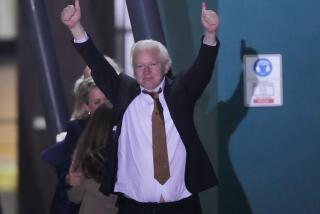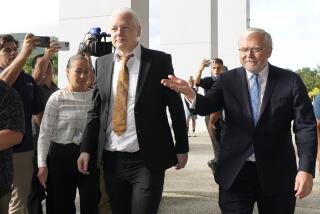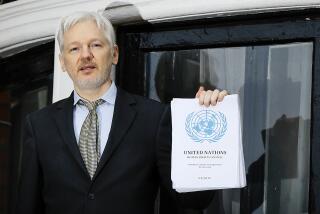WikiLeaks’ Julian Assange leads hidden, busy life in Ecuador’s embassy
- Share via
Reporting from London — For close to 1,000 days, one of London’s most prestigious neighborhoods has been the site of a diplomatic standoff.
On one side: the British government.
On the other: Julian Assange, possibly the world’s most-wanted political asylum seeker.
The WikiLeaks founder has been holed up in the Ecuadorean Embassy since June 19, 2012, avoiding extradition to Sweden for questioning concerning sexual assault allegations. Ecuador has granted Assange political asylum, but he cannot get to South America because British police remain stationed around the embassy, ready to detain him if he steps outside.
The situation recently returned to the forefront when a freedom of information request from LBC Radio revealed that maintaining 24-hour guard around his hide-out has cost taxpayers $15.4 million.
“It is sucking our resources,” Metropolitan Police Commissioner Bernard Hogan-Howe told reporters, and a review was underway of “what options we have.”
For Assange, the options appear limited. If he leaves the embassy and is caught, he will be sent to Sweden. And once he is in Sweden, he could be extradited to the United States for prosecution on espionage charges related to WikiLeaks’ massive release of classified U.S. military documents and diplomatic records.
If found guilty, he could face life in prison or even the death penalty.
The statute of limitations on the rape case will expire in August 2020, but no one wants the situation to drag on unresolved for that long.
From the start, Assange’s team has offered Swedish prosecutors the chance to question him in the embassy.
The move was “actively welcomed” by the British Foreign Office, but prosecutors are adamant that the interview must take place on Swedish soil.
In August, Assange cryptically told reporters that he planned to leave his hide-out soon but had no plans to hand himself in to British police. Nothing dramatic ensued.
In November, there were hints that the diplomatic logjam could clear.
Sweden’s court of appeals rejected a bid by Assange’s lawyers to drop the arrest warrant against him. But the court also said prosecutors were not doing enough to “move the preliminary investigation forward.” That implied that efforts should be made to bring the situation to some conclusion.
Even if Sweden were to drop its investigation, it is unclear whether Assange would feel safe to leave the embassy with the threat of a U.S. prosecution hanging over his head.
Assange, 43, has offered glimpses of his life in the one-floor embassy through interviews with journalists in person and via Skype.
He runs three to five miles a day on a treadmill supplied by film director Ken Loach.
In one interview, he revealed that he was attending twice-weekly personal training sessions with a former British special forces officer.
His quarters, once a corner office overlooking a short dead-end street, has Internet access, a kitchenette, a table and a bookshelf.
A light that mimics blue sky shines on to his ceiling, because his access to sunlight is limited.
Assange has appeared on the balcony of the red-brick building on a few occasions to deliver speeches to supporters. Otherwise he stays out of view, working up to 17 hours a day or watching TV programs and movies, including episodes of “The Twilight Zone” and “The West Wing.”
A hundred days into his ordeal, Assange likened his confinement to “a little bit like being in a space station.”
At the 500-day mark, he acknowledged that it was difficult to “see the same walls” day after day, but seemed to have established a routine.
“I am doing good work and I have no time for anything else, so it’s a bit counterproductive to trap me here, because what else can I do but work?”
Assange says that the embassy staff members have become like family and that he often has meals with them. Sometimes ceviche is on the menu.
He also has had a slew of visitors, including artist Yoko Ono and singer Lady Gaga, in his tiny domicile a stone’s throw from the luxurious Harrods department store.
He may be trapped, but he does not portray himself as a man who is bored.
“I have my heart and soul in this work,” he told London’s Telegraph newspaper. “I have a very capable and loyal staff, and we have a lot of supporters around the world who believe in what we do and want to see if it continues.
“So although I am trapped in these walls, intellectually I am outside with our people today and that to me is important.”
Boyle is a special correspondent.
More to Read
Sign up for Essential California
The most important California stories and recommendations in your inbox every morning.
You may occasionally receive promotional content from the Los Angeles Times.













